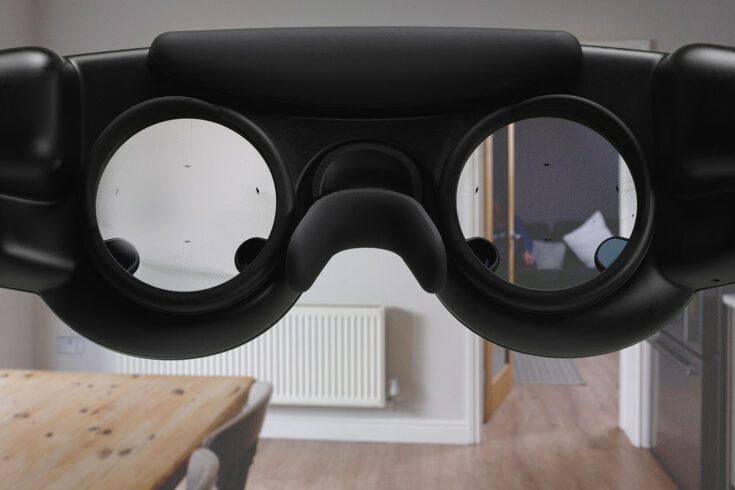The solution they developed is now poised to transform the daily lives of millions living with the condition.
Parkinson’s disease is a progressive neurological disorder that severely impacts motor functions, particularly walking and balance.
Traditional therapies, such as cueing therapy, which uses visual and auditory prompts to by-pass the pathways damaged by Parkinson’s have shown promise in managing these symptoms. However, their use has been largely confined to clinical settings, limiting their accessibility for everyday situations.
Strolll’s ground-breaking solution works by projecting real-time visual and auditory cues through special glasses which harness the power of artificial intelligence (AI) technology and augmented reality (AR) to bring these therapies into the daily lives of those affected.
Jorgen explains:
Tom’s dad would have problems walking down the hall, but when it came to climbing stairs, he had no problem – this is where cueing therapy can help.
Parkinson’s is incredibly complex, affecting our human autopilot. Movements that most people don’t even think about – like walking and swallowing – are exactly what Parkinson’s impairs.
The brain is amazing; it can control different movements, but you can’t just switch gears like you would in a car. So, we have to force the brain to do that with external stimuli.
Video credit: UK Research and Innovation
Video transcript and on-screen captions are available by watching on YouTube.
The technology
Strolll’s ground-breaking solution to stimulate the brain in everyday settings for those affected by Parkinson’s, was to develop the software for AR glasses which they have called NavigAIt. They work by tailoring cues to each user’s specific needs using AI and machine learning.
For example, as a person with Parkinson’s walks through their home or navigates public spaces, the software continuously assesses their gait, balance, and surrounding environment. It then provides the most effective cues, such as coloured lines or rhythmic sounds, to help them overcome symptoms like freezing or an unsteady gait.
Brent Poynton, Chief Technology Officer, explains:
The interface itself is akin to a Heads-Up Display (HUD) in a self-driving car, guiding users toward their intended destination. We can use the technology built into the AR glasses you have on your head, and through that we can understand exactly where in the world you are, as well as what in the world is around you.
Using real life feedback, the computer can then give you prompts to get there.
Strolll is experienced in the development of rehabilitation tools for those with Parkinson’s, and NavigAIt is the next leap in Strolll’s existing rehabilitation products. NavigAIt offers an innovative, AI-driven solution that integrates seamlessly into daily life, surpassing previous applications which are either limited to clinical settings or designed to be therapeutic games accessed at home.
Impact and vision
Strolll’s ultimate goal through the use of their software is to empower people with Parkinson’s to live without the fear of mobility-related symptoms. Jorgen envisions a future where people can purchase AR glasses online or from their local telecom shop, choosing styles and aesthetics that suit their tastes.
The glasses are versatile, allowing users to check emails, watch TV and more. This would mean users of NavigAIt will be indistinguishable from the general public, allowing them to discreetly manage symptoms and walk confidently in any setting without the anxiety of freezing or falling.
Partnerships and progress
Strolll’s success is bolstered by strong partnerships, including collaboration with Dr Melvyn Roerdink at Maastricht University in the Netherlands.
Samatha Richmond, Vice President of Quality and Regulatory Affairs explains:
Maastricht are providing the scientific expertise we need to run randomised control trials, recruit patients, conduct studies, and analyse the clinical effectiveness of our technology. Strolll combines this with our technological capabilities to develop machine learning products and the work to register medical devices.
The partnership has also provided Strolll with valuable insights into medical device regulations across the EU, paving the way for international expansion to countries like Germany, France, and eventually the US.
Samantha explains:
Because our product results in people accessing our software though glasses there are, rightly, stringent regulations we need to adhere too to show this product is safe for people to use.
From science fiction to reality

Tom (left) and Nigel Finn (right).
Credit: Strolll
So, will Tom’s father Nigel soon be able to wear a pair of NavigAlt AR glasses and enjoy a pint in his local?
Not quite yet as they are still looking at environment impacts such as people walking in front of you or an uneven floor, but Jorgan says it’s an exciting time:
With the advancements in AI, the progress in AR technology, and the growing acceptance of AR glasses, we’re at a pivotal point where we can make this technology and software available to people with Parkinson’s.
The technology is all there, our job now is to get this software into people’s homes.

